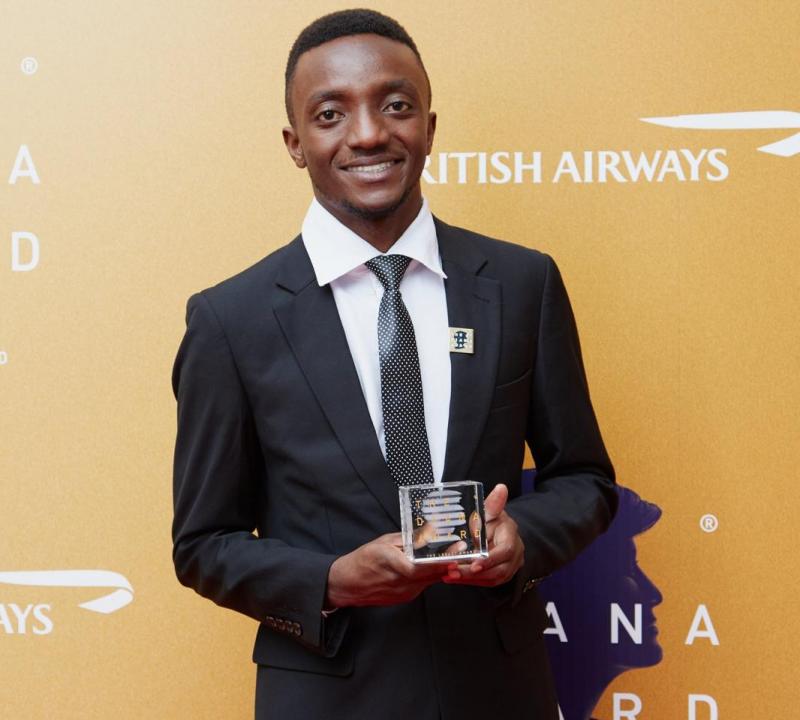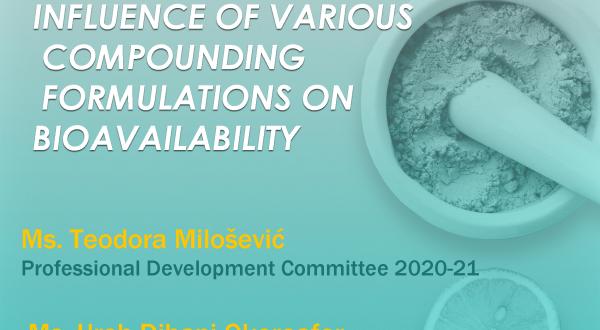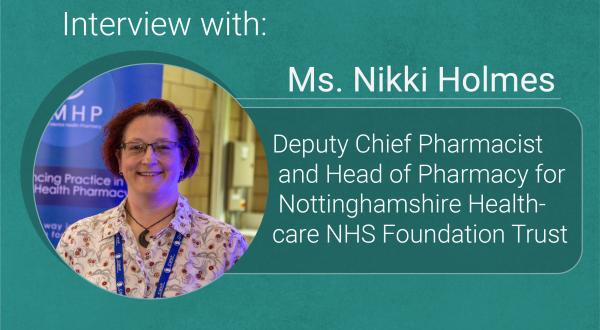
AfRO SHINES A LIGHT: ERICK VENANT
Last December, the IPSF-AfRO Media & Publications subcommittee had a chat with IPSFer, Erick Venant, who was recently honoured with the Diana Legacy Award. Erick is passionate about antimicrobial resistance and he is doing great work at the grassroots level in Tanzania, having successfully led an antimicrobial resistance campaign, reaching 23 administrative regions of Tanzania and educating over 49,000 students and teachers in 114 secondary schools. Explore, through this interview, how “AfRO Shines A Light” on Erick’s blazing trails as a pharmacist in Tanzania.
RMPO: Hello, Erick. It's great to have you here. Thank you for accepting to do this. Congratulations on your selection as a 2019 Diana Legacy Awardee! It's thrilling to see a pharmacist win this. ? So how did you receive the news of your selection as a Princess Diana Legacy awardee?
Erick Venant: Good day, Taiwo. Thank you very much. I was very excited to receive the news about being one of the 2019 Legacy award recipients. I have previously received other awards but this was special! It's not only representative of my achievement but it is also the recognition of young people's contributions to the society, which often goes unrecognized. I represent the efforts of many people behind! Of course, we did, we have been doing and we will keep doing the excellent job together with many people.
RMPO: Hmmmm! That's interesting, Erick. You're 25 and have done beautifully for yourself so far. What regrets do you have? What do you wish you could/should have done better?
Erick Venant: Personally, I do not have any big regrets so far. All of the decisions I have made in the past have brought me to where I am today. Like anyone else, I could have done a couple of things differently, but I do not have any real regrets.
RMPO: I see. Many young people, these days, seek clarity. How can one find clarity for himself?
Erick Venant: I think it begins with knowing the positive impacts of what you can offer as a young person, knowing your strengths and how can they be transformed for the wellbeing of the society, being able to weigh and see the end results of what you are doing and being able to take calculated risks, as well as the power of focusing on what you believe is right, while following a path that will fulfill what you have intended to achieve for the betterment of the society.
I have benefited greatly from mentorship. Having mentors who are always able and willing to devote time to help you progress will go a long way too.
RMPO: Well said! Thank you very much, Erick. So tell me, what motivated Roll Back Antimicrobial Resistance (RBA) Initiative? ?
Erick Venant: I had a burning desire to become a part of solutions to most pressing global health challenges. RBA Initiative came as part of sustained efforts on antimicrobial resistance (AMR). I wanted also to increase the urgency of tackling AMR. I saw the effects caused by AMR— 700,000 annual deaths globally and the possibility of an exponential increase to about 10 million people in 2050! I realized that AMR was not given the required attention. I felt that the problem was underrated. That's why I decided to put further efforts in tackling AMR, founding a NGO with special focus on antimicrobial resistance was an important step. We did a great AMR awareness campaign when I was serving under Tanzania Pharmaceutical Students' Association (TAPSA). I am grateful to all who volunteered for that campaign. The experience revealed how healthcare students can well transform the little knowledge they get from school to serve the society. The challenges we had with the first huge AMR awareness campaign in Tanzania and how it was successful will always remain in my heart. I remember how glad I was when the campaign was recognized by WHO and I said yes, students and young people can do something with impact while schooling. I am happy for the foundations we put and the ongoing job done by students on AMR.
I will like to place an emphasis on the fact that AMR requires collective and sustained efforts. We still need many stakeholders to join the passionate global efforts in AMR advocacy. I encourage all pharmacy students, other healthcare students and young professionals across the region and beyond to do something on AMR and other global health challenges. They have a crucial role in raising awareness, researches, innovation & technology and engaging with policymakers. We must incorporate one health concept and work together with other professionals to tackle the problem. For pharmacy students, you don't need to have your degree, diploma or certificate to take bold steps in improving the health sector. You don't need to be a professor or have a doctorate to start transforming little knowledge, for the sake of improving public health. That's also a part of learning while you are at school.
RMPO: ✨✨✨ Your words are so apt, Erick! We don't need a doctorate before we can improve public health. Thank you, Erick. The world is currently tending towards social impacts, with volunteering as a core component. In fact, RBA has about 122 anti-microbial resistance ambassadors volunteering their time to spread awareness in their respective communities. How were you able to get the right persons aboard your project?
Erick Venant: Thank you! Some people had a true interest and a level of experience in volunteering already. Motivation to do quality work was what they required. Others wanted to learn what volunteering entailed. These two groups required a leader who would motivate and empower them to take initiative for social good. A good leader should be able to do these. When your actions inspire others, it becomes easier for volunteers to be committed to the goal. Effective communication of the team's vision will also go a long way. For example, I have led different public health campaigns including a breast cancer campaign in 3 administrative regions of Tanzania and AMR campaigns in 23 administrative regions of Tanzania. During the projects, I felt awed by the commitment and sacrifices of the volunteers. Truth be told, it may take some time for a leader to get to that point. Hence, a leader must be in constant communication with the team about the successes and failures of the team. I must also state that the right team is crucial to the success of an initiative. The leader at the front cannot steer the course of the team alone. It is a collective effort. It has to be. I encourage pharmacy students to explore volunteerism. Students associations are a great platform for students to explore their abilities and provide value to the society.
RMPO: Interesting! I totally agree with the fact that the right team is crucial to the success of an initiative. What inspired your interest in social development in the first place?
Erick Venant: The society needs our contribution and the fact that some of the health challenges can be alleviated by simple measures like raising awareness, motivated my foray into the social development space. The deaths caused by drug resistance infections, for example, could increase to 10 million people annually worldwide if more efforts will not be made to beat AMR. The success of our previous projects keeps me moving, making me to set higher goals every time. I am grateful for the support I get from my mentors, challenging me to do even more.
RMPO: Fantastic!!! I'm glad that you mentioned mentors. Could you share with us, some of the people who have positively impacted your public health journey?
Erick Venant: On AMR at the global level, I have been impressed by the exploits of Prof. Dame Sally Davies in putting the AMR agenda at global level. She has raised the profile of AMR on the world stage, calling for urgent measures to be taken to curb AMR. Prof. Sally is currently the UK special envoy on AMR and she is the former Chief Medical Officer for England. On April 29, the UN’s Inter-Agency Coordination Group on Antimicrobial Resistance, which she co-convened, published a report that stated that immediate, coordinated and ambitious action is needed to avert the crisis. Davies also helped to establish a £265 million (US$344-million) UK government fund to develop laboratories around the world, to track the problem of AMR. She was for three years the chair of the World Health Organization (WHO) Strategic and Technical Advisory Group on AMR.
A mentor who has supported me so far is Dr. Eva Ombaka, a senior pharmaceutical expert who is the chairperson of RBA Initiative's organizational board. She has been a fantastic mentor and a truly great inspiration to me. Dr. Eva Ombaka is currently a board member at Health Action International, an advisor to ReAct-Action on Antibiotics resistance and a senior lecturer at St. John’s University of Tanzania. She was also a winner of Ole Hansson Award 2007 for her commitment to access to essential medicines and 'rational use of medicines over the years. Prior to that, she was the coordinator of the Ecumenical Pharmaceutical Network for 17 years and the founding member of Health Action International Africa.
I am grateful to all my mentors, for through them, I have been shaped to be a better person and professional.
RMPO: Powerful! It's not common to find pharmacy students and graduates engaged in social ventures. So tell me, how did you manage social impacts with Pharmacy school?
Erick Venant: Pharmacy school is difficult and it was a challenge excelling at public health initiatives and pharmacy school. I needed a lot of sacrifices and courage to take calculated risks. When I was the President of Tanzania Pharmaceutical Students Association, I really wanted to transform the image of the association and establish sustainable foundations. Achieving this needed a lot of sacrifices with time, money, academics and other aspects of life.
I thought it was more gratifying to translate the good grades we were getting in class to the improvement of public wellbeing. I realized that undergraduate study was a good point to start. For me, organizing a successful blood donation event which can save the lives of 83 children was an A in my perspective. Successfully sensitizing the public about early detection of breast cancer and diabetes, and empowering young girls to do breast cancer self-examination was an A in my perspective. Organizing events to educate women about cervical cancer was an A in my perspective. Leading the nationwide antimicrobial resistance campaign and putting the foundations for the sustainability of these and more, was thoroughly fulfilling. However, we cannot afford to forget the place of studying, getting the relevant knowledge and passing our examinations. I was able to prioritize by focusing on accomplishing the most important tasks that I was capable of doing myself and delegating the rest to other team members. Being a leader does not put away your responsibility as a student, so I took calculated risks and made sure I passed my examinations, although my performance dropped (Hahaha). I should add that sometimes, our educational system makes us blind, to think that we cannot do anything outside of class. School gives a lot of pressures and this is making us lose a lot of talents and potentials. What we learn in class is very important but we must also complement this by learning life skills, so that we can become better professionals. I encourage students not to ignore participation in professional conferences and other similar activities aiming to serve the society. That's also a process of learning, a vital aspect of education!
RMPO: Great words there, Erick. Thank you very much. Which awards have you won for your works in social development?
Erick Venant: I have been awarded the Pharmacy Week Honorary Award presented by the deputy minister of health in Tanzania and organized by the Pharmacy Council, Tanzania. I also received the Special Achievement Award by St. John’s University of Tanzania, The Diana Award and The Legacy Award. The last two were from The Diana Award Charity, in memory of Princess Diana. The Diana award recognizes young people for making an outstanding difference in their communities. It takes place every year and it recognizes many young people selected by the internal team at the Diana Award Charity. The Legacy award celebrates achievements of only 20 outstanding young leaders, visionaries and role models across the world who have demonstrated the ability to inspire and mobilize new generations to serve their communities. 2O young people are selected from a pool of Diana Award recipients who have received the Diana Award within two years preceding the Legacy Award year. Legacy Award takes place every two years. Legacy Award winners are selected by external judges.
However, I will like to point out that these awards and any other kinds of recognitions are not just for my own achievements but for all young people whose work goes unrecognized. Personally, I am always representing the efforts of many people who really devote their precious time to make social initiatives successful. Nonetheless, we should always work to serve the community without expecting the awards or any other kind of returns. Our focus should be to bring positive changes in our communities!
RMPO: Such a list of huge awards!!!! Congratulations again, Erick. Thank you for emphasizing the need to focus not on awards, but the positive changes in our communities. Well said, Erick. ???? You are such an inspiration. Could you share with us your IPSF journey?
Erick Venant: Thank you very much. I remember the African Pharmaceutical Symposium (AfPS) I attended in Mombasa in 2016. That was very special. I became motivated to contribute to improving public health during that event and soon after returning home, I organized and led what was known Likizo na Jamii move in three regions and another campaign which was known as Jamii Inakuhusu Public health campaign in Dodoma region, Tanzania. A few years down the line, I am now a passionate advocate of antimicrobial resistance! I have served with IPSF-Afro and TAPSA. I also attended AfPS in Kumasi, Ghana where I participated in the Leaders-in-Training (LIT), IPSF World Congress in Mendoza, Argentina and the last world congress in Kigali, Rwanda. Participating in IPSF activities has been a life-changing experience. IPSF is a great platform where one can get lifelong learning experiences, professional networking and other important skills. You will be prepared to become a better pharmacist through engaging with IPSF via Pharmaceutical students associations. I encourage pharmacy students to be active in their local associations and participate actively in IPSF-AFRO and IPSF activities.
IPSF is a pharmily !
RMPO: Fantastic experiences you've got through IPSF! I'm sure that through your testament, more Pharmacy students will be challenged to become more active in their local associations and in IPSF as a whole. It's truly great to see how you've have grown and have been groomed through IPSF. What do you think of African youths?
Erick Venant: African youths have an ability to bring positive changes to their communities. We must take initiatives, we should take action today and be like volcanoes! Let's go further and seek to be engaged. Let's first fulfill our responsibility by taking initiative to solve various challenges in our society. Then, let's seek to be engaged in decision making, policy making and the sharing of our solutions.
RMPO: What do you think is the solution to the leadership problem of Africa, seeing that you once served in your local pharmaceutical association?
Erick Venant: I think first, leaders must understand that leaders are servants that public interest must be of primary priority! Before taking up a certain position, one should evaluate: Will I do the right thing in this position? If not, don't take the position, don't be a leader because of prestige or because there are positions to fill. Evaluate yourself and see if you will make positive impacts and most importantly, ensure sustained positive impacts. Become committed. Be courageous,. Cooperate with people. Ask for God's assistance and guidance.
RMPO: Well said, Erick. East Africa is a very beautiful region. What do you love about Tanzania? Why should I visit Tanzania for the holidays?
Erick Venant: Tanzania is my motherland, I love a lot of things about my country. Tanzania is the country of amazing beauty and kind people! Tanzania offers some of the world’s most diverse safari experiences including the lush and abundant Ngorongoro Crater, the world famous Serengeti National Park, and the beautiful wilderness of Tarangire National Park. Tanzania is also the home of the highest mountain in Africa, Mt.Kilimanjaro and the beautiful spice island- Zanzibar, great lakes like Lake Victoria, the third largest fresh water lake in the world by area and lake Tanganyika, the second largest fresh water lake in the world by volume and depth! Tanzania has even more to offer. Rich cultural diversity, fabulous beaches and idyllic islands are another reason to visit Tanzania.
RMPO: Beautiful! I do look forward to visiting Tanzania soon.
Erick Venant: That would be great.
RMPO: It was great speaking with you, Erick. ? Thank you for seeing this through, despite your busy schedule. ? Thank you also, for being a shining example to pharmacy students and pharmacists generally. Do keep the flag flying. Keep blazing trails. ??????
Erick Venant: Thank you too, Taiwo. Thank you.
This interview was conducted by Taiwo Olawehinmi, on the auspices of IPSF-AfRO Media & Publications subcommittee. We do hope that Erick Venant's story struck a chord in your heart, challenging you to do better for your country, for Africa, and indeed, for the world.



